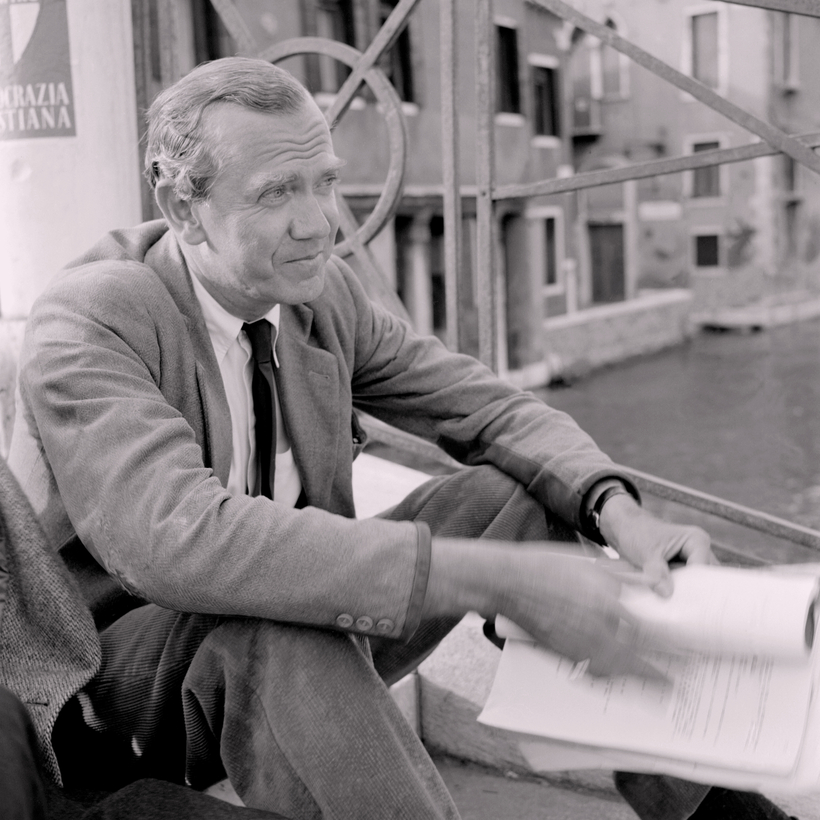A single sentence jotted on the back of an envelope in a public lavatory after a solitary dinner in Mayfair: “I had paid my last farewell to Harry a week ago, when his coffin was lowered into the frozen February ground, so that it was with incredulity that I saw him pass by, without a sign of recognition, among the host of strangers in the Strand.” Shortly thereafter, the film producer Alexander Korda asked Graham Greene to turn his sentence into a screenplay. It was 1947, and Korda wanted the picture set in Austria—he had money there that he couldn’t get out, due to currency restrictions—so he gave Greene $700 to go to Vienna. Korda, Greene, and director Carol Reed had just adapted Greene’s story The Fallen Idol, which would win the BAFTA for best British film in 1948, and Greene was on the verge of his first great literary success after more than two decades of modest esteem and spotty sales. The Heart of the Matter would sell more than 300,000 copies, liberating Greene from his a day job as an editor and rendering him a perennial candidate for the Nobel Prize he never won.
Vienna was full of rubble and split into four zones by the occupying French, British, American, and Soviet armies. The Hotel Sacher, where Greene put up, had its kitchen supplied with meat and vegetables from the black market while much of Vienna was still on meager rations. Scouting the city for settings, Greene hit on the large central cemetery for the opening scene. He learned of men who moved through Vienna’s sewers, smuggling adulterated penicillin. He met with spies, including the double agent Peter Smollett, a Times of London correspondent working for the Russians, and played a practical joke on the visiting Elizabeth Bowen by predicting a police raid at the nightclub where they were drinking that he had in fact arranged with a British officer. Add to all this a friendship betrayed and a love triangle and you have an archetypal Greene plot.
The writing and planning of the film took place among producer, director, and screenwriter over martinis on Korda’s yacht (joined by passengers Randolph and Pamela Churchill and Vivien Leigh), on Capri, in London, and in Hollywood. It was there that a fourth man, producer Harry O. Selznick, insisted the film have American leads, but he balked at Reed’s choice for the role of Harry Lime, preferring Noël Coward. It was Korda who backed Reed in casting Orson Welles, whose face emerging from the shadows made the movie iconic, and whose contributions (the famous “cuckoo clock” speech) juiced an already brilliant script of Greene’s. Cue the zithers.
He learned of men who moved through Vienna’s sewers, smuggling adulterated penicillin. He met with spies, including a Times of London correspondent working for the Russians.
I linger on the story of the making of The Third Man because it exemplifies the virtues of An Unquiet Englishman: A Life of Graham Greene, by Richard Greene (no relation), a professor of English at the University of Toronto. Here we have the genesis of a major work scrupulously reconstructed with a minimum of fuss, lots of vivid detail, and scant sensationalism. Even the urinary-tract hemorrhage Greene suffered in New York while on his way home from California, the result of a rare surpassing of his “Homeric tolerance for liquor,” plus drug use (likely Benzedrine), exhaustion, and extreme stress, is dealt with matter-of-factly. (Prescription: no drinking for 10 days and a barbiturate.)
On the flight back to London, he read Aldous Huxley’s Ape and Essence, a gift from the actor Ralph Bellamy. “Greene despised the book,” his biographer writes in characteristic deadpan, “after which the sedative must have come as a blessing.” That is the sort of mild and harmless speculation that Greene the biographer indulges in. The book is refreshingly low on would-haves, must-haves, and probablys. It appropriately relays doctors’ reports but does not pathologize. It is neither melodramatic nor suffused with emotion, nor bent on existential questions of morality—very different, in other words, from a Graham Greene novel.
Given that Greene’s psychological swoons and tumultuous love life have been exhaustively plumbed in two previous major biographies—Norman Sherry’s ran to three volumes—as well as any number of ancillary studies and friends’ memoirs, his new biographer’s focus on his work, travels, journalism, and political life makes for a bracing personal history that will send readers straight back to the novels. They are the legacy of a headmaster’s son who was bullied and became re-acquainted with one of his tormentors while on assignment in Indochina, where he stood him up for a rendezvous; of a Catholic convert whose contemplation of sin brought solace to many fellow believers and the occasional inquisition from the Vatican; of a sullen teenager who carried around a revolver loaded with one bullet playing Russian roulette by himself in the woods and grew up to work side by side with Kim Philby and dine with Fidel Castro. A life full of affairs and benders and 500 words a day at least. He lived the history of the 20th century and inscribed more of the world in his books than any writer of his time.
Christian Lorentzen is a Brooklyn-based writer


